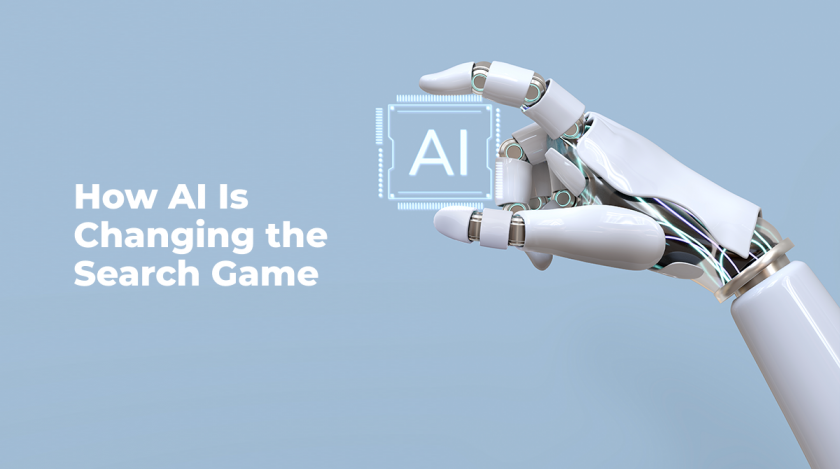As technology continues to evolve, the SEO (Search Engine Optimization) game is also changing. AI (Artificial Intelligence) is making an impact on the way search algorithms are designed, and this is set to have a major effect on the way businesses use SEO to reach their target audiences. In this blog post, we’ll take a look at the evolution of SEO, discuss how AI is changing the search game, and explore how businesses can use AI to their advantage in their SEO strategies.
What is AI
AI, or Artificial Intelligence, is a form of technology that allows computers to mimic human behavior and make decisions. It is a type of technology that has been around for decades, but its use has recently become much more widespread and sophisticated. You can use AI in a variety of industries from healthcare to finance, as well as in SEO. AI uses algorithms to process data and help businesses understand their customers better, allowing them to tailor their services to best fit their needs. It also allows for more efficient automation of processes, making tasks easier and faster to complete. Surely, AI is the key to the future of business, and it is having a major impact on the way we use the internet.
Artificial intelligence (AI) is an exciting field that seeks to replicate human intelligence in machines. This involves creating algorithms and computer programs that can process, understand, and respond to complex data and tasks. AI has already revolutionized many industries, from healthcare and finance to transportation and entertainment. Self-driving cars, intelligent personal assistants like Siri and Alexa, and facial recognition technology are just a few examples of how AI is changing the way we live and work. The possibilities for AI are limitless, and researchers are constantly pushing the boundaries of what is possible, making AI one of the most exciting and rapidly evolving fields of our time.

How has AI changed SEO
AI, or Artificial Intelligence, has had a major impact on the world of search engine optimization (SEO). AI has enabled search engine algorithms to become more accurate and sophisticated. Therefore, businesses in Melbourne looking to optimize their sites for the first page of search results need to consider AI-based SEO strategies. AI has also enabled search engine algorithms to detect spam and manipulative practices. Search engine algorithms can now detect unnatural link-building and keyword stuffing, allowing them to penalize websites engaging in these practices. As a result, those looking to do First Page SEO in Melbourne must ensure that they are taking a holistic approach to SEO and only engaging in legitimate and natural SEO practices.
AI has transformed SEO, using algorithms to predict user intent and personalize search results. Search engines now understand the context behind search queries, leading to a more sophisticated approach to website ranking. While this has made SEO more complex, the benefits of AI in delivering accurate and relevant results cannot be overstated. With AI algorithms becoming more complex and sophisticated, SEO strategies must now be tailored to these algorithms.
Finally, AI is being used to improve the personalization of search results. Search engine algorithms can now personalize results based on a user’s location, preferences, past search history, etc. This means that businesses in Melbourne must take into account the local context when optimizing their sites for the first page of search results.
What does the future of SEO look like
The future of SEO is expected to be shaped by Artificial Intelligence (AI). The significance of AI in determining the top search results has escalated. AI-powered algorithms are capable of comprehending user intent and providing more pertinent outcomes, resulting in higher click-through rates.
Artificial intelligence (AI), machine learning, and natural language processing (NLP) are among the advanced technologies transforming SEO in the future. With AI, search engines are becoming more adept at understanding user intent and delivering more personalized search results. SEO professionals must create user-centric content to reach their target audience’s needs and preferences. As voice search and smart assistants become more prevalent, the emphasis on optimizing content for natural language queries is increasing. With the proliferation of mobile devices, local search optimization will also become increasingly important. As businesses seek to connect with consumers in their immediate area. To summarize, optimizing content for AI algorithms is the key to the future of SEO, requiring the creation of engaging, relevant, and valuable content. It surely meets the evolving needs of users in a fast-paced and constantly changing digital landscape.
Search engine companies will continue to use AI to better understand user queries and provide relevant results. As a result, SEO professionals must stay on top of their game and adjust their tactics accordingly. To optimize content for different search engines, companies may need to invest in AI tools. However, growth based on improving off-page SEO is critical because it is the only indicator for search engines to see which website has the most relevant content authority and which one has the best ranking potential.
Search engines will use AI to personalize search outcomes for individual users, considering their prior searches and preferences.
AI is Changing the Search Game: Conclusion
In conclusion, rapid changes and advancements in technology have marked the evolution of search engine optimization (SEO). From the early days of keyword stuffing and link-building to the sophisticated AI algorithms and natural language processing of today, SEO has undergone a dramatic transformation. SEO experts must adapt to optimize their content for both search engines and human audiences. With the advent of voice search, mobile optimization, and personalized search results, the future of SEO is exciting and challenging. And the only way to stay ahead of the curve is to keep up with the latest developments and trends. SEO is all about creating high-quality, engaging content. That meets users’ needs and interests while also helping businesses reach their marketing objectives, regardless of tools and tactics.















